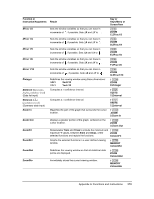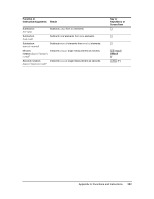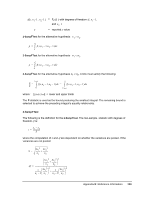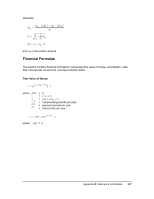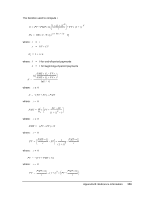Texas Instruments TI-84 PLUS SILV Guidebook - Page 390
Appendix B: Reference Information, Variables
 |
View all Texas Instruments TI-84 PLUS SILV manuals
Add to My Manuals
Save this manual to your list of manuals |
Page 390 highlights
Appendix B: Reference Information Variables User Variables The TI-84 Plus uses the variables listed below in various ways. Some variables are restricted to specific data types. The variables A through Z and q are defined as real or complex numbers. You may store to them. The TI-84 Plus can update X, Y, R, q, and T during graphing, so you may want to avoid using these variables to store nongraphing data. The variables (list names) L1 through L6 are restricted to lists; you cannot store another type of data to them. The variables (matrix names) [A] through [J] are restricted to matrices; you cannot store another type of data to them. The variables Pic1 through Pic9 and Pic0 are restricted to pictures; you cannot store another type of data to them. The variables GDB1 through GDB9 and GDB0 are restricted to graph databases; you cannot store another type of data to them. The variables Str1 through Str9 and Str0 are restricted to strings; you cannot store another type of data to them. Except for system variables, you can store any string of characters, functions, instructions, or variables to the functions Yn, (1 through 9, and 0), XnT/YnT (1 through 6), rn (1 through 6), u(n), v(n), and w(n) directly or through the Y= editor. The validity of the string is determined when the function is evaluated. Archive Variables You can store data, programs or any variable from RAM to user data archive memory where they cannot be edited or deleted inadvertently. Archiving also allows you to free up RAM for variables that may require additional memory. The names of archived variables are preceded by an asterisk (*) indicating they are in user data archive. System Variables The variables below must be real numbers. You may store to them. Since the TI-84 Plus can update some of them, as the result of a ZOOM, for example, you may want to avoid using these variables to store nongraphing data. • Xmin, Xmax, Xscl, @X, XFact, Tstep, PlotStart, nMin, and other window variables. Appendix B: Reference Information 383



